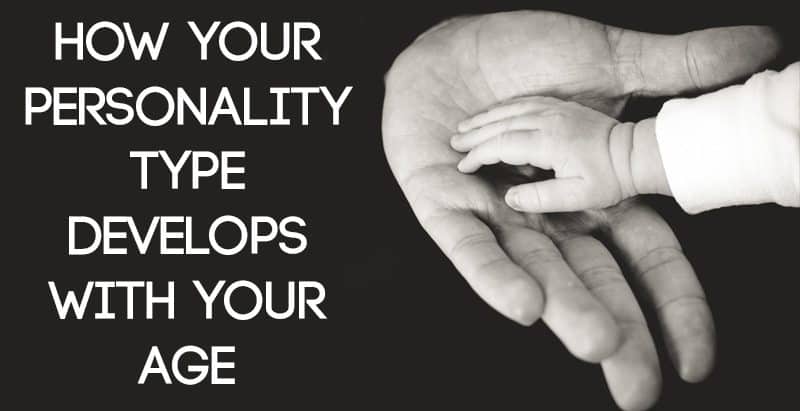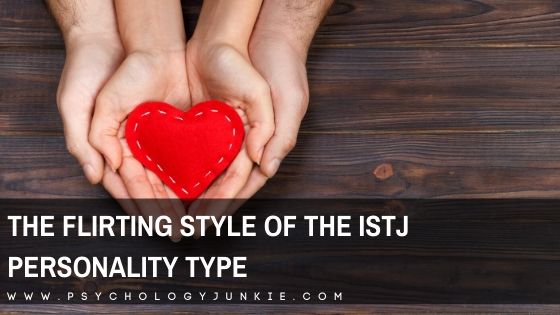How Your Personality Type Develops With Your Age
Have you ever looked back on your life and cringed at mistakes you made or the way you behaved? I know I have, and still do. As a teenager I lived like there was no tomorrow, making a multitude of mistakes, taking risks, and trying hard to fit in with a group of teenagers that I had absolutely nothing in common with. I’d grown up in a fairly solitary way; a dorky homeschooled kid who never got up the nerve to make many friends. As a teenager, I switched gears, remade myself into what I thought was the socially ‘cool’ thing to be, and created a completely false persona that I tried to pass off as “me.”
Not sure what your personality type is? Take our new personality questionnaire here. Or you can take the official MBTI® here.

The truth is that a lot of people have a time in their life when they’ve had to ask themselves “What was I thinking?” For some people their age of ‘crazy’ is the teenage years, for others it’s a mid-life crisis, others find themselves feeling as if their whole identity has changed in their 60’s or 70’s. I’ve often wondered what happens to people or what changes to make them go through these stages in their lives. Obviously, a lot has to do with factors like environment, health, changes in stress, or hormones. But does your personality type have anything to say about these changes? I wanted to find out.
You have to have a relatively good understanding of the cognitive functions to understand what the rest of this post is about; you can find out more about these here.
Your Age and the Development of the Cognitive Functions
Your Dominant and Auxiliary Functions
From birth to about age 13, you will develop your dominant function. This function will be the most obvious in children and will be the one they develop the most control of in their lives. You will see glimpses of their auxiliary function as well, but it will still be underdeveloped and not quite balanced.
From 13 to about age 21, you will develop your auxiliary function. This function will support your dominant function. If you’re an introvert, your auxiliary function will be the one you show to the outside world while your dominant function will be more hidden.
The dominant and auxiliary functions are the most powerful facets of your personality and are generally where you have the most natural strength and ability to grow.
How do these cognitive functions affect teenagers?
The teenage years are tumultuous for almost everyone in some way. Part of this has to do with your brain development. Research has shown that the human brain doesn’t fully mature to adulthood until the early 20s. In the teen years, the parts of the brain responsible for controlling impulses and planning ahead are the last to mature. Along with this, you have hormonal changes, the pressures of life (figuring out where you’ll go to college, getting a good score on the SAT, fitting in with your peers) and you have a breeding ground for stress and chaos. Don’t get me wrong, the teenage years can be full of magic, wonder, and possibility. Being a teenager can feel like being on a roller coaster of highs and lows. When it comes to your personality type and the teenage years, you really haven’t fully developed your auxiliary, tertiary, or inferior functions well enough to be fully balanced. You are still relying very heavily on your dominant function and are just learning how to balance that out with your auxiliary function.
The Tertiary and Inferior Functions
From the age of 21 to the mid-40s, you will develop your tertiary function. While this will never be as strong as your dominant or auxiliary functions, it will help to balance them out if developed properly.
From your 40s through your 70s, you will develop your inferior function more completely. This function will always be a weak point in your personality because it is never going to be nearly as easy to use as your dominant or auxiliary function. However, with proper practice, you can use it with much greater ease than you did in earlier life.
Complete Development of All the Functions
When you’ve reached the age where your inferior function is developing, you may be surprised by a new side of yourself you haven’t seen before. A staunch, logical thinker suddenly finds himself weeping over an insurance advertisement. A woman who has always been highly emotional and people-oriented suddenly develops an interest in mechanics or a more ‘thinker’ type activity. This doesn’t mean that they disregard their dominant and auxiliary functions, but that now they have developed good control over all their functions and they are able to use them all effectively. The dominant and auxiliary functions will always be the major players in your personality, but now you can enjoy a new sense of balance with the aid of your tertiary and inferior functions.
When Problems Arise
There will always be those who don’t focus on developing their functions well. Some people are so in love with their dominant functions that they focus on them to the complete exclusion of their other functions. This is why it’s important to work at using and considering all your functions. Of course, you will be most comfortable with your dominant function, and by all means, find activities and pursuits which utilize that great strength you have. Just make sure to take some time to notice and exercise your other functions to achieve a healthier, more balanced life.
Other Articles You Might Enjoy:
https://www.psychologyjunkie.com/2017/09/23/teenage-struggles-every-myers-briggs-personality-type/
https://www.psychologyjunkie.com/2020/03/10/the-childhood-wounds-of-every-enneagram-type/
https://www.psychologyjunkie.com/2020/10/13/the-auxiliary-function-of-every-myers-briggs-personality-type/
Find out more about your personality type in our eBooks, Discovering You: Unlocking the Power of Personality Type, The INFJ – Understanding the Mystic, and The INFP – Understanding the Dreamer. You can also connect with me via Facebook, Instagram, or Twitter!
Get Your Free eBook!

Subscribe to our newsletter and get an eBook packed with powerful parenting tips for each personality type! Enjoy 28 beautifully illustrated pages exploring the needs and strengths of all 16 personality types in childhood.















As for me, I developed my tert Fi at a very young age due to a traumatic experience in my life, hence I tend to have problems determining my primal judging function, but always end up with the conclusion that I definitely have a TeFi core, and not FeTi. This frequently makes me insecure, which I honestly hate, but when I sit down and analyse myself, I determine that I definitely use Fi, but an extremely well-developed one that makes me more sympathetic towards others than the average INTJ… thus the occasional insecurity about my supposed Fe.
As a child, my Ni was showing obviously — it made me to constantly think about my future; what it will be like once I am an adult, what job I will have, what I will do to organize my life, how I will make sure my existence is resting on sure grounds, how many children I will have, what my husband will look like, what it will be like to be standing at my marriage, etc. I liked picturing my whole future, and spent most of my time bundled up in those visions. (On the other hand, I also had morbid visions, where I constantly asked myself what I would do if my parents died, and how I would deal with the loss. I didn’t want to be helpless when that happened. I knew it would be sudden and without a warning in advance, and I wanted to be prepared for that scenario, too. I nonetheless wanted my visions to be rational, so I acknowledged that life isn’t just about sunshine and pink fluff all around.)
Often, when my parents wanted to surprise me, I already had a feeling that something was going on in the background, and I always ended up sniffing out the surprises before due time. The best example I can bring up to this is the following: I was in grade 2, and my parents bought a new car that day. They came to the school to pick me up, and the both of them deliberately let me go ahead. At the relatively empty parking lot, I walked to the car they bought (and which I haven’t seen before in my life) and turned to them, “Aren’t you coming?” — I figured there was something special there because they never came together to pick me up after school, and for some reason, I just knew that this whole thing had something to do with a car. As for how I knew which was the one they bought, I honestly have no idea. I can’t remember anything else besides that, only that once we hit the road, I was bombarding Dad with questions about the car; why he chose that colour, why that car, what were the advantages that set it above the other models, etc.
I also loved crosswords and those drawing games where I had to connect the dots in order, but before following the actual rules and connecting them according to their numbers, I would always try to figure out what they would end up on my own. Later, I could tell what the picture was going to depict before even touching the pencil to the paper.
Since my mother used to read a lot to me, I taught myself to read before grade 1. (I was frustrated that I couldn’t read anything that my cousins could, and I wanted to know what was written without their help, too. Basically I just hated to be at other people’s grace. In retrospect, I would say it was because I had already been so focused on fending for myself later on.) Then the next step was writing — I really wanted to learn it, so I taught myself that as well. The first words I wrote were ‘mom’ and ‘dad’.
I used to draw and engage in physical activities more when I was younger, which is why I’d risk to declare that I was a healthier and more balanced INTJ at the age of 7 than I am right now, which I think is sad. Currently I’m trying not to lose touch with my Te and find the balance between that and my overly active Fi. I also have strong feelings about the teaching system, which is I think to be partially blamed for me eventually getting worse and worse at independent thinking (my first Math teacher was my nightmare, and she always scolded me when I wanted to do something on my own terms. I was constantly fallen astern from the rest of the class either because I couldn’t get the way she was explaining the curriculum to us or because I wanted to figure out a new way to solve the question to make it easier for myself.) However, my last teacher told me that I have a very unique way of thinking and the mind of a scientist, and I’m happy about that.
I wasn’t intend to write such a long comment here, but it turned out like this on its own accord.
I love your comments, they are so insightful and helpful to me! It is really nice to be able to talk about these things, especially since I am Fe/Ti and sometimes don’t have as good a grasp of Te/Fi. I am very sorry you’ve had to recover from a traumatic experience, and that your teachers weren’t very encouraging in school (except for that last one!). I think the school system is hard because they have such a “one size fits all” mentality for teaching, and especially here in the US, everything is so focused on test scores. I was homeschooled growing up, and now that’s what I’m doing for my kids (homeschooling them). It’s hard, but I feel like I can tailor their learning experience more this way and encourage them in a more natural learning style for them.
That is so interesting about your Ni! I have very similar stories I could tell since I also am Ni-dominant. Often I would have a distinct feeling that something was wrong with a particular person in my family, even if they weren’t anywhere near me I could sense that something very particular was wrong. In fact, sometimes it’s felt almost scary. I remember being outside my house when I was teenager and hearing my younger brother screaming inside at the top of his lungs. I went racing inside the house to try to find him and when I did he was just sitting perfectly calmly playing a video game and had no idea what I was talking about with the screaming. But he had kind of a hard childhood and I always felt very protective of him, and I often tended to sense when something was wrong with him. I would always worry about what could happen, and try to prepare for what could be, and I could spend hours lying on the floor daydreaming about my future. That was probably my favorite thing to do – that’s when I’d get “in the zone” I guess. It makes sense now after some of the research I’ve done. I read in Dario Nardi’s ‘The Neuroscience of Personality’ that Ni-dominant types (INTJs and INFJs) reach a zen brain-state when they are tasked to envision the future. He could see this with the brain scans that he did. It’s a really good book if you’re ever looking for something that explains more of the scientific side of personality.
I think it’s great that you taught yourself to read and write! You seem very ambitious – I am curious if you are a scientist now!
Thanks again for the feedback and sharing with me!
Haha, fun fact that I helped you on Facebook too, when you were doing your research for the INTJ movie taste post 😉
I’m very glad that my comments help you! You can ask whatever you want, if you are interested — I think it’s important to help each other get a grasp of the opposite functions as well, and it can be done best by sharing personal experiences of how the dynamics manifest. As always, you can’t learn anything solely from books. (For the record, I have a really hard time understanding how Si operates besides the conventionality and fondness for traditions.)
I have already heard about that zen-like state, and it fascinated me! I would love to read the book, have already come across it on Amazon in fact, but currently I don’t have any free resources to order it, so it will have to wait.
You are very nice that you remember that goal of mine! No, I’m not a scientist yet, but I am going to become one eventually.
That homeschooling sounds really nice, by the way. I think I will take that option into account once I have my own family, too.
Thank-you for your comment. It helped me make sense of myself. I also went through a hard childhood, and I have a hard time with typing my personality. I thought I was a INFJ for years, or else an INJ, no specification. But recently have found myself an INTJ with strong INFJ tendencies. Talking about your past helped realize how much I was influenced as a kid. Thank-you.
I’m an INTP, so my dominant function is Ti and auxiliary is Ne. I find it odd that the dominant one, the main/”only” one for the first 13 years of life, is for making decisions, and then the auxiliary is for taking in information. How can someone make decisions based on “nothing?” As a mom of a two year old, I can understand and would have expected that younger kids take in the world around them first (either an S or N) and then they would develop their “decision-maker” (T or F). But it seems half the types would be like mine and do it the other way around.
I do understand that more than JUST the dominant function can be used earlier, but still…
And this is not a disagreement or skepticism! Lol. Maybe just that “learning by arguing” trait 😉 Pondering and musing…
I’ve enjoyed this and other posts. They’ve been informative and well-written.
Hi Jani! I should probably go into this post and edit it a little bit so that it doesn’t sound like that’s the only function a child uses till age 13 🙂 Basically what I meant was that from birth to age 13 it’s the only function that is really being mastered at all, and when they make decisions they will largely favor that function. For example, my ESFP stepson when he makes decisions focuses on what would be the most fun sensory experience or the most entertaining way to spend the moment (Se), he thrives on that Se impulsiveness and present-moment living. He isn’t really getting in depth with his Introverted Feeling yet because right now, at this point in his life, he’s so focused on Extraverted Sensing. My 10-year-old INTJ daughter definitely uses Extraverted Thinking (Te) when making decisions, but she doesn’t have a very healthy grasp of it yet. So yes, definitely children will use their decision-making function as children, but it will almost always be in favor of the dominant function and they may not use it very adeptly; that will come later in the teen years. I hope this helps!! Thanks for asking the question 🙂
Do you think some people develop on different timeliness? I’m asking because I’m a classic INTP. No matter how many times I test, I’ve been a strong INTP in every test from my teen years until now. Even so, I truly relate to the “suddenly crying over insurance ads” bit.
I went from having cried maybe 4 times in my life to all the sudden being weepy over every Christmas commercial, sweet speech, or kind note. This happened at around age 23. I wonder if it has to do with becoming a teacher. I think that by forcing myself out of my interpersonal comfort zone so I could have a job that allowed me to pass on knowledge and discuss ideas, I may have sped up my development in the Feelings area. Is that possible?
I also think that since my mother passed away, I work harder to be more of a guardian like she was, though that’s not my natural style. All total, I think our experiences must shape the way our personality type develops. Thoughts?
The official MBTI website says the primary function develops completely at around age 7. Can you clear up this contradiction?
I am going to have to get my MBTI manual and double-check what it says. I know you continue to develop your dominant function throughout your entire life, so it isn’t completely developed at any particular age. I know I just finished the MBTI® certification course in August, and the instructor confirmed that you don’t start developing the auxiliary till the teen years. But I’m going to look at my manual and double check and respond here as soon as I’ve got the complete answer for you 🙂
Thanks, I think I misquoted and misunderstood what the website actually said…
It’s a reliable source? I’m pretty sure to be sensitive, but my NI tertiary is more like 35% (30 Years). It’s my average attested by the most part of MBTI test. I can be more and less.
I was wondering do people still have the same characteristics and traits from when they were children to adulthood but more developed?
Alexandria. Believe me you change.I was a frightened introverted rabbit as a child until about 12.I was great at maths the sciences and architectural pursuits.By 30 I was flairful in retail management but at 37
moved into financial sales and managent.
I also developed a management consultancy business.
I retired at 56 to Spain a confirmed INTJ but spent many years as an ENTJ when communication was king.
Terence
It was very odd stumbling upon this. I was trying to find a link between high iq and highly developed tertiary functions.
It’s odd because your story eerily mirrors my own. I was home schooled as well due to Tourette’s (kids are mean). I started to get my condition to a manageable place and, like you, it became all about behaving in whatever way got people to like me. Continued until college and lead me into a toxic 7 year relationship. After it ended, I had no idea who I was.
I’m an ENFJ and also 31 and the lead up to thirty has been interesting. I’m starting to develop a new appreciation for art and history. I’ve also become fascinated with mixed martial arts. I was always more like a thinker rather than a doer so it’s refreshing to be energized by things that I never used to care for.
It’s cool to point to the development of my Se for some of those aspects of my life.
Hi, I was wondering about something, in cases of neglect where the authority figure of a child is more theoritical than concrete, is it possible for the child to develop their judging function even if it’s auxiliary-tertiary than their dominant function? Like an ESTP relying more on Ti and Fe?
‘Cause there’s someone I know who I’m sure is an ESTP who as a kid seemed to use a lot more his Ti (and Fe) than on his Se-Ni but who, when he’s faced with any new situation tended to naturally lean more toward indulging in, he just immediately stopped himself because he was a “good son”. He had been in an car accident at 3 because of a drunk driver and had PTSD so he noticed early that his parents only paid attention to him positively when he behaved well or when he had bad nightmares (but bc the nightmares weren’t on his terms and bc he didn’t want them to worry, he decided to tell them he didn’t have them anymore and he didn’t want to drive his parents away more than they already were so “becoming a good boy” was his solution).
Since then he’s found a… healthier family (not perfect but a lot better) and he’s been able to develop his Se more and more. and he shows really more of a Se-Ti order now that he doesn’t have his “I have to be on my best behavior” thing. I mean he still has PTSD and also depression now so it still affects his type, but generally he’s able to indulge in his more opportunistic nature. When he sees something he finds interesting, he does it (he doesn’t do a lot of dangerous things because he knows how dangerous they are and he’d like to live long enough to start living without too many mental health issues).
oh and he’s 16 and was adopted into his new family at 13 a couple of months after his parents died